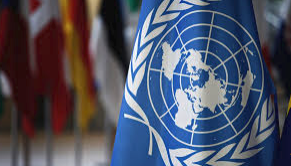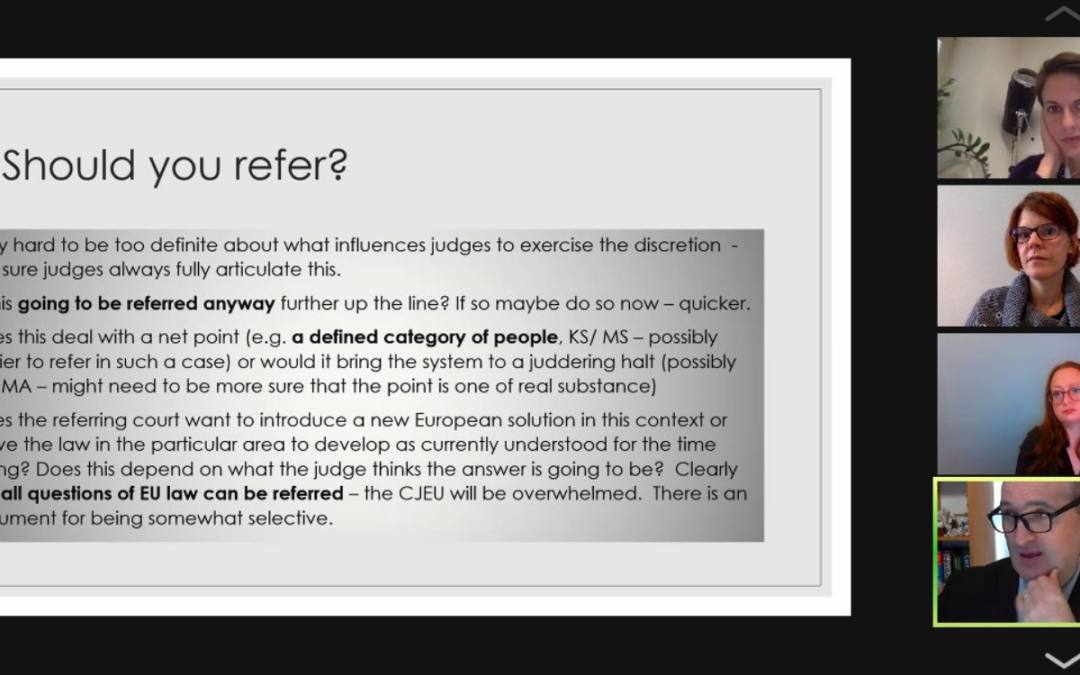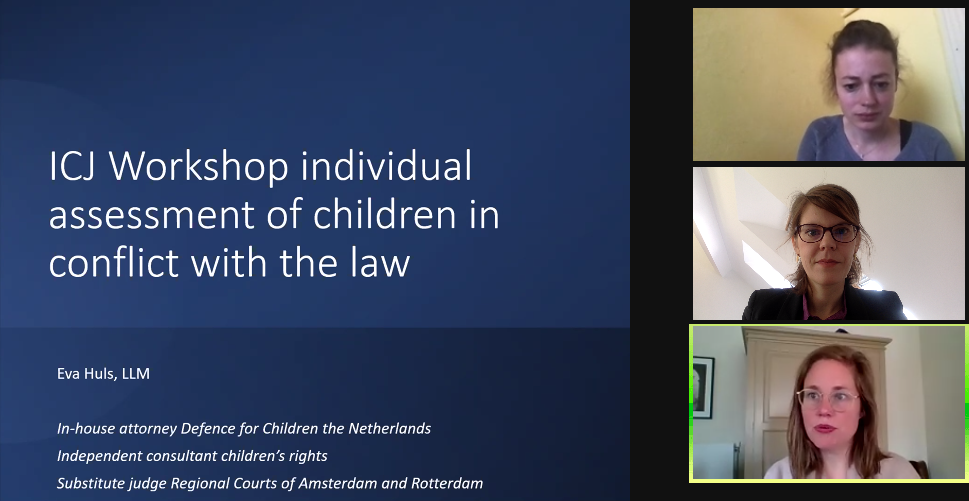
Oct 6, 2023 | Cases, Uncategorized
The International Commission of Jurists (ICJ), together with the AIRE Centre (Advice on Individual Rights in Europe), the Dutch Council for Refugees and the European Council on Refugees and Exiles (ECRE) submitted today a third party intervention in the Communicated case No. 193/2022, before the UN Committee on the Rights of the Child.
The case concerns immigration detention of an 11-year-old girl from Afghanistan together with her older sister and parents, pending transfer to another EU Member State according to the EU Dublin Regulation.
The interveners focus in their submission on the prohibition of immigration detention of children, including when accompanied by family members, the right to be heard, access to information and legal representation and age assessment in the migration context.
The full intervention can be read here.

Oct 7, 2021 | News
Judges must view safe country of origin designations with caution and need to make sure individual cases are properly assessed in asylum procedures, judges and experts said during a seminar for Irish and Czech judges held by the International Commission of Jurists (ICJ), Immigrant Council of Ireland and Forum for Human Rights.

Apr 29, 2021 | News
It is important to involve children suspected or accused of breaching the law, in the proceedings in a rights-based way, agreed judges, prosecutors and probation officers during a seminar for Czech and Slovak professionals, organised by the ICJ and Forum for Human Rights on 28 and 29 April.
The individual assessment according to Article 7 EU Directive 2016/800 on procedural safeguards for children suspected or accused in criminal proceedings should serve as a genuine right of the child, rather than as evidence, the seminar was told.
Speakers at the seminar emphasized that the actions of children often only reflect how they were treated by adults – including by parents, teachers, or public authorities, who have failed to address systemic inequalities and situations of discrimination. The contact of the child with the justice system provides an opportunity to help the child, to show them that they have rights and an important role in the society, and involve them actively in the proceedings, experts said. The environment in which the child grows up may have an important impact on the child’s behaviour.
During the seminar, professionals and experts discussed a number of practical questions, such as how to work with information in a child’s case: how sources in reports and assessments for the court should be as objective as possible, up to date, and how sources should be verified, so that information is not doubled or amplified in the individual assessments.
A considerable part of discussion in the seminar was dedicated to restorative justice principles and how these can serve professionals in contact with children in the justice system, in order to ensure the rights-based approach.
Restorative justice experts pointed out that most children grow out of crime without any intervention, and so minimum intervention is usually the best approach to prevent crime in the future. They explained the benefits of giving the child the feeling of control and involving them in the search for solutions, so they will feel respected, and are more likely to see the process as fair and are more likely to follow the decision made.
Practical exercises were part of the seminar and participants actively engaged and shared their concerns and challenges they encounter in their work.
The two seminars gathered over 50 judges, public prosecutors, probation officers and experts from the Ministry of Justice from both countries working in the field of child justice or family law. Experts included Mikiko Otani, ICJ Commissioner and member of the Committee on the Rights of the Child, Dainius Puras, former UN Special Rapporteur on the Right to Health, as well as judges and academics other EU Member States and from the European Forum on Restorative Justice, FORUM and the ICJ.
See the full agenda here:
In English
In Czech
The PRACTICE project is implemented by the ICJ-EI and Forum for Human Rigths aims at building the capacity of judges and other relevant professionals to ensure effective individual assessments of children in criminal proceedings in the Czech Republic and Slovakia. It supports the implementation of EU Directive 2016/800, as well as international human rights law obligations of the states concerned. In the second part of the project the ICJ-EI will draft and publish recommendations on individual assessments of children with specific vulnerabilities, to support an EU-wide interpretation and application of Article 7 of Directive 2016/800, in light of international human rights law.
This project was funded by the European Union’s Rights, Equality, and Citizenship Programme (2014-2020). The content of this publication represents the views of ICJ only and is its sole responsibility. The European Commission does not accept any responsibility for use that may be made of the information it contains.

Mar 17, 2021 | News
All children regardless of their age must have access to procedural rights when they are accused of criminal acts, the Council of Europe’s European Committee of Social Rights decided in a landmark case (No. 148/2017) brought by the International Commission of Jurists (ICJ) with support from the Prague-based Forum for Human Rights.
The ICJ and Forum lodged a complaint challenging the failure of the Czech Republic to provide for legal assistance to children under the age of 15 (the age of criminal responsibility in the Czech Republic) in the pre-trial stage of proceedings and failure to provide alternatives to formal judicial proceedings for them.
The European Committee of Social Rights, which is responsible for oversight of the European Social Charter of 1961, found the Czech Republic was violating the rights of children under 15, who face proceedings in the child justice system but are below the age of criminal responsibility. The Committee found that the failure to provide these due process safeguards violated the rights of the children to social protection under Article 17 of the 1961 Charter. Human rights protected under the European Social Charter are legally binding on States party to it.
“The Committee’s decision is ground-breaking in many ways, yet two implications are revolutionary. First, it clearly emphasises the inter-dependence between fair-trail rights and child’s well-being. In modern human rights law, there is no such a thing as a clear-cut division between civil and political rights and social rights. But most importantly, the decision undermines paternalistic attitudes towards young children who enter the juvenile justice system and makes clear that all children – regardless their age – must be ensured adequate procedural protection in the course of the whole proceedings, based on the restorative justice principles,” said Maroš Matiaško, senior legal consultant of Forum.
The decision of the European Committee on Social Rights should lead to fundamental changes in the Czech child justice system, Forum for Human Rights and the International Commission of Jurists said today.
“We brought this case to ensure that children below the age of criminal responsibility do not have lower standards of protection of their rights compared to the older children in the child justice system,” said Karolína Babická, ICJ Legal Adviser. “We expect the Czech Republic to swiftly implement the decision of the Committee and ensure that all children regardless their age have access to procedural rights and alternative procedures like settlements and conditional termination or withdrawal of prosecution.”
Background
The legal findings come following a collective complaint submitted to the European Committee on Social Rights by Prague-based Forum for Human Rights and the International Commission of Jurists in 2017.
The Committee’s decision is built on two legal grounds, (I) mandatory legal representation for all children in conflict with the law regardless of age already in the pre-trial stage and (II) their access to alternatives in line with restorative justice principles.
On the first ground, the Committee found that the State must ensure mandatory legal assistance to children below the age of criminal responsibility already in the pre-stage of the proceedings. The reasoning is built on four grounds:
–Children below the age of criminal responsibility are not always able to understand and follow pre-trial proceedings due to their relative immaturity. It cannot therefore be assumed that they are able to defend themselves in this context.
–Children below the age of criminal responsibility should be assisted by a lawyer in order to understand their rights and the procedure applied to them, so as to prepare their defence. The failure to ensure legal assistance for children below the age of criminal responsibility in the pre-trial stage of proceedings is likely to impact negatively on the course of the proceedings, thereby increasing the likelihood of their being subjected to measures such as deprivation of liberty.
–Legal assistance is necessary in order for children to avoid self-incrimination and fundamental to ensure that a child is not compelled to give testimony or to confess or acknowledge guilt.
–The assistance of a lawyer is also necessary in situations where parents/legal guardians have interests that may conflict with those of the child and where it is in the child’s best interest to exclude the parents/legal guardians from being involved in the proceedings. Therefore, the Committee concluded that mandated separate legal representation for children is crucial at the pre-trial stage of proceedings.
In relation to the second legal ground, the Committee emphasised that diversion (alternatives to proceedings, such as settlement or conditional termination or withdrawal of criminal proceedings) from judicial proceedings should be the preferred manner of dealing with children in the majority of cases and diversion options should be available from as early as possible after contact with the system, before a trial commences, and throughout the proceedings. The principle applies to an even greater degree to a situation in which children below that age can still be engaged in the child justice system.
It may be left to the discretion of States Parties to decide on the exact nature and content of diversion measures, and to take the necessary legislative and other measures for their implementation, though there are relevant standards that should be taken into account, especially those developer by the UN Committee on the Rights of the Child.
Collective complaints alleging violations of obligations under the European Social Charter, may be brought against States which have ratified the 1995 Additional Protocol to the European Social Charter. On the basis of the European Committee on Social Rights’ decision on a collective complaint, the Council of Europe Committee of Ministers may recommend that the State take specific measures to implement the decision.
Read the full decision here.
See more information about the case here.
Watch our talk on the case and its importance:
Contact:
Karolína Babická, Legal adviser Europe and Central Asia Programme; karolina.babicka(a)icj.org









